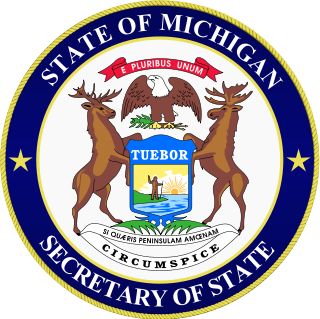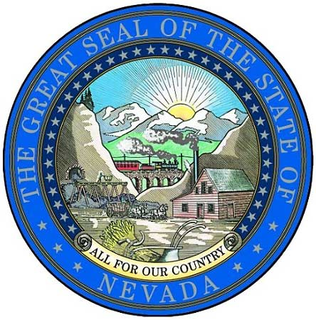Operations
Amongst other things the Commercial Register contains information on:
A registered office is the official address of an incorporated company, association or any other legal entity. Generally it will form part of the public record and is required in most countries where the registered organization or legal entity is incorporated. A registered physical office address is required for incorporated organizations to receive official correspondence and formal notices from government departments, investors, banks, shareholders and the general public.
Proxy voting is a form of voting whereby a member of a decision-making body may delegate his or her voting power to a representative, to enable a vote in absence. The representative may be another member of the same body, or external. A person so designated is called a "proxy" and the person designating him or her is called a "principal". Proxy appointments can be used to form a voting bloc that can exercise greater influence in deliberations or negotiations. Proxy voting is a particularly important practice with respect to corporations; in the United States, investment advisers often vote proxies on behalf of their client accounts.
Financial capital is any economic resource measured in terms of money used by entrepreneurs and businesses to buy what they need to make their products or to provide their services to the sector of the economy upon which their operation is based, i.e. retail, corporate, investment banking, etc.
The functions of the Commercial Register with respect to the information submitted are publication, examination, control and safekeeping. The content may be taken as accurate by any party referring to the register.
The entries to the Commercial Register are made by a judge or an authorised employee (Rechtspfleger, lit. "law caretaker"). As of 2007 all submissions to the Register have to be made electronically. Companies in the Register are given a unique Handelsregisternummer by their local district court (Amtsgericht) [1] .

A judge is a person who presides over court proceedings, either alone or as a part of a panel of judges. The powers, functions, method of appointment, discipline, and training of judges vary widely across different jurisdictions. The judge is supposed to conduct the trial impartially and, typically, in an open court. The judge hears all the witnesses and any other evidence presented by the barristers or solicitors of the case, assesses the credibility and arguments of the parties, and then issues a ruling on the matter at hand based on his or her interpretation of the law and his or her own personal judgment. In some jurisdictions, the judge's powers may be shared with a jury. In inquisitorial systems of criminal investigation, a judge might also be an examining magistrate.
Anybody may request an extract from the Commercial Register about a specific company, the so-called Ausdruck (printout), which was formerly known as Handelsregisterauszug or HR-Auszug. A simple extract is usually priced at €10.00, a notarized one about €20.00 (as of May 2016). Information about registered companies can also be downloaded online (Handelsregister online, the common register portal of the German federal states), but may require prior registration. It is possible to retrieve PDF printouts (then called Abdruck) with different level of information, e.g. AD - Aktueller Abdruck contains only the most current information whereas CD - Chronologischer Abdruck comprises current and historical data. A fee of €4.50 for each printout will be charged (as of May 2016). Simple publications (VÖ - Veröffentlichungen) are free of charge. [2] [3]

A notary public of the common law is a public officer constituted by law to serve the public in non-contentious matters usually concerned with estates, deeds, powers-of-attorney, and foreign and international business. A notary's main functions are to administer oaths and affirmations, take affidavits and statutory declarations, witness and authenticate the execution of certain classes of documents, take acknowledgments of deeds and other conveyances, protest notes and bills of exchange, provide notice of foreign drafts, prepare marine or ship's protests in cases of damage, provide exemplifications and notarial copies, and perform certain other official acts depending on the jurisdiction. Any such act is known as a notarization. The term notary public only refers to common-law notaries and should not be confused with civil-law notaries.
Until 2005 legal entities were mostly obliged to publish their Annual Reports by sending it to the Commercial Register. Starting with fiscal year 2006 this obligation has been transferred to the Bundesanzeiger, the (electronic) Federal gazette of the German government. Electronic submission is also mandatory here. Entries to the Commercial Register are also sent to the Bundesanzeiger and published by them. Newspapers sometimes also publish new entries, although since 2009, entries to newspapers are no longer mandatory. [4]

A fiscal year is used by government accounting and budget purposes, which varies between countries. It is also used for financial reporting by businesses and other organizations. Laws in many jurisdictions require company financial reports to be prepared and published on an annual basis, but generally, do not require the reporting period to align with the calendar year. Taxation laws generally require accounting records to be maintained and taxes calculated on an annual basis, which usually corresponds to the fiscal year used for government purposes. The calculation of tax on an annual basis is especially relevant for direct taxation, such as income tax. Many annual government fees—such as Council rates, license fees, etc.—are also levied on a fiscal year basis, while others are charged on an anniversary basis.
The Bundesanzeiger is an official publication of the Federal Republic of Germany published by the German department of Justice with a scope similar to that of the Federal Register in the United States. It is used for announcing laws, mandatory legal and judicial announcements, announcing changes in the Handelsregister and for legally mandated announcements by the private sector. It is being superseded by the elektronischer Bundesanzeiger (eBAnz) in recent years.

A Gesellschaft mit beschränkter Haftung, meaning "Company with limited liability", is a type of legal entity very common in Germany, Austria, Switzerland and Liechtenstein. It is an entity broadly equivalent with the private limited company in the United Kingdom and many Commonwealth countries, and the limited liability company (LLC) in the United States. The name of the GmbH form emphasizes the fact that the owners of the entity are not personally liable or credible for the company's debts. GmbHs are considered legal persons under German, Swiss and Austrian law. Other variations include mbH, and gGmbH for non-profit companies.

A limited liability partnership (LLP) is a partnership in which some or all partners have limited liabilities. It therefore can exhibit elements of partnerships and corporations. In an LLP, each partner is not responsible or liable for another partner's misconduct or negligence. This is an important difference from the traditional partnership under the UK Partnership Act 1890, in which each partner has joint and several liability. In an LLP, some or all partners have a form of limited liability similar to that of the shareholders of a corporation. Unlike corporate shareholders, the partners have the right to manage the business directly. In contrast, corporate shareholders must elect a board of directors under the laws of various state charters. The board organizes itself and hires corporate officers who then have as "corporate" individuals the legal responsibility to manage the corporation in the corporation's best interest. An LLP also contains a different level of tax liability from that of a corporation.
Civil registration is the system by which a government records the vital events of its citizens and residents. The resulting repository or database has different names in different countries and even in different US states. It can be called a civil registry, civil register, vital records, and other terms, and the office responsible for receiving the registrations can be called a bureau of vital statistics, registry of vital records and statistics, registrar, registry, register, registry office, or population registry. The primary purpose of civil registration is to create a legal document that can be used to establish and protect the rights of individuals. A secondary purpose is to create a data source for the compilation of vital statistics.
The Data Universal Numbering System, abbreviated as DUNS or D-U-N-S, is a proprietary system developed and regulated by Dun & Bradstreet (D&B) that assigns a unique numeric identifier, referred to as a "DUNS number" to a single business entity. It was introduced in 1963 to support D&B's credit reporting practice. It is standard worldwide. DUNS users include the European Commission, the United Nations, and the United States government. More than 50 global industry and trade associations recognize, recommend, or require DUNS. The DUNS database contains over 300 million entries for businesses throughout the world.

The Michigan Department of State is administered by the Secretary of State, who is elected on a partisan ballot for a term of four years in gubernatorial elections.

In United States business law, a registered agent, also known as a resident agent or statutory agent, is a business or individual designated to receive service of process (SOP) when a business entity is a party in a legal action such as a lawsuit or summons. The registered agent's address may also be where the state sends the paperwork for the periodic renewal of the business entity's charter. The registered agent for a business entity may be an officer or employee of the company, or a third party, such as the organization's lawyer or a service company. Failure to properly maintain a registered agent can affect a company negatively.
An eNotary is a Notary Public who notarizes documents electronically. One of the methods employed by eNotaries is the use of a digital signature and digital notary seal to notarize digital documents and validate with a digital certificate. Electronic notarization is a process whereby a notary affixes an electronic signature and notary seal using a secure Public key to an electronic document. Once affixed to the electronic document, the document is rendered tamper evident such that unauthorized attempts to alter the document will be evident to relying parties. The e-notary will use cryptography and Public key infrastructure to create, manage, distribute, use, store, and revoke the digital certificate. The Electronic Notary also must keep an electronic register of each act performed.
The Secretary of State of Rhode Island is an elected office in the U.S. state of Rhode Island. As of 2015, the current Secretary of State is Nellie Gorbea.
The Secretary of the State of Connecticut is one of the constitutional officers of the U.S. state of Connecticut. It is an elected position in the state government and has a term length of four years.

The Secretary of State of Colorado is the secretary of state of the state of Colorado in the United States. The office is one of five elected constitutional offices in the state. The current Secretary of State is Democrat Jena Griswold.

The Secretary of State of Nevada is a statewide elected office in the State of Nevada. The secretary of state post is common to many U.S. states. In Nevada, it is a constitutional office.

The Secretary of State of Kansas is one of the constitutional officers of the U.S. state of Kansas. The current secretary of state is former Speaker pro tempore of the Kansas House of Representatives, Scott Schwab, who was sworn in on January 14, 2019.
The Secretary of State of Montana is one of the elected constitutional officers of executive branch of the U.S. state of Montana.
A resident register is a government database which contains information on the current residence of persons. In countries where registration of residence is compulsory, the current place of residence must be reported to the registration office or the police within a few days after establishing a new residence. In some countries, residence information may be obtained indirectly from voter registers or registers of driver licenses. Besides a formal resident registers or population registers, residence information needs to be disclosed in many situations, such as voter registration, passport application, and updated in relation to drivers licences, motor vehicle registration, and many other purposes. The permanent place of residence is a common criterion for taxation including the assessment of a person's income tax.
Mortgage Electronic Registration Systems, Inc. (MERS) is an American privately held corporation. On October 5, 2018, Intercontinental Exchange and MERS announced that ICE had acquired all of MERS. MERS is a separate and distinct corporation that serves as a nominee on mortgages after the turn of the century and is owned by holding company MERSCORP Holdings, Inc., which owns and operates an electronic registry known as the MERS system, which is designed to track servicing rights and ownership of mortgages in the United States. According to the Department of the Treasury, the Board of Governors of the Federal Reserve, The Federal Deposit Insurance Corporation and the Federal Housing Finance Agency, MERS is an agent for lenders without any reference to MERS as a principal.
In the United States, a notary public is a person appointed by a state government, e.g., the governor, lieutenant governor, state secretary, or in some cases the state legislature, and whose primary role is to serve the public as an impartial witness when important documents are signed. Since the notary is a state officer, a notary's duties may vary widely from state to state and in most cases bars a notary from acting outside his or her home state unless they also have a commission there as well.

United Arab Emirates corporate law regulates the governance, finance and power of corporations in the United Arab Emirates (UAE) through UAE law. Every emirate has its own basic corporate code.

Wörwag Pharma is an independent family-owned pharmaceutical company headquartered in Böblingen, Germany. It was founded in 1971 by Fritz Wörwag, a pharmacist. It sells prescription and over-the-counter preparations as well as food supplements.











